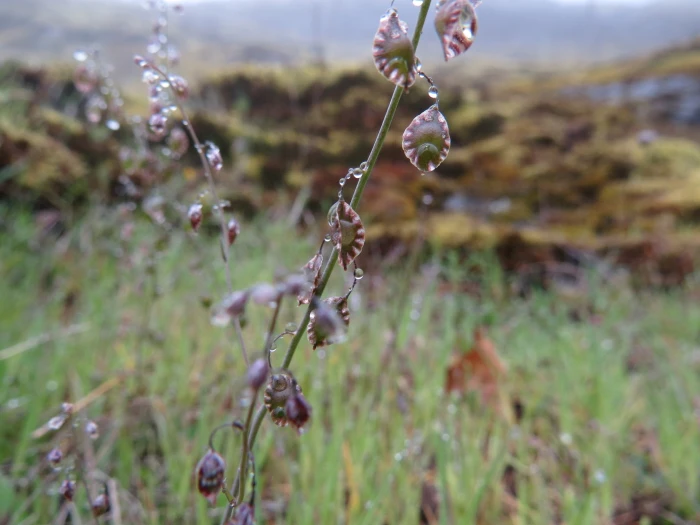Sand Fringepod
(Thysanocarpus curvipes)
Sand Fringepod (Thysanocarpus curvipes)
/
/

Jack Bindernagel
CC BY 4.0
Image By:
Jack Bindernagel
Recorded By:
Copyright:
CC BY 4.0
Copyright Notice:
Photo by: Jack Bindernagel | License Type: CC BY 4.0 | License URL: http://creativecommons.org/licenses/by/4.0/ | Rights Holder: Jack Bindernagel | Publisher: iNaturalist | Date Created: 2022-04-30T03:11:51-07:00 |
























Estimated Native Range
Climate Requirements
| • Precipitation | 3" - 107" |
| • High Temp. | 64°F - 111°F |
| • Low Temp. | 6°F - 49°F |
Summary
Thysanocarpus curvipes, commonly known as sand fringepod or lacepod, is an annual herb native to a variety of habitats including grasslands, open woodlands, and chaparral regions of western North America, from British Columbia to Baja California. It typically grows to a modest height of up to 31 inches tall, either producing a single stem or branching out. The foliage consists of lance-shaped leaves that can vary in size. During its flowering season, which occurs in spring, Thysanocarpus curvipes produces an inflorescence of delicate white or occasionally purple-tinged flowers. Its most distinctive feature is the fruit, a flattened, disc-like capsule surrounded by a thin, translucent wing, which can be quite variable in appearance and contributes to the plant’s common name due to its fringed look.
Sand fringepod is appreciated for its unique seed pods that add textural interest to wildflower gardens and naturalized areas. It is easy to grow and maintain, often self-seeding in suitable conditions. In cultivation, it prefers full sun to part shade and requires well-drained soils. While it is not commonly used in formal garden settings, it is an excellent choice for native plant gardens, restoration projects, and xeriscaping due to its drought tolerance. Gardeners should be aware that in some conditions, it may become weedy.CC BY-SA 4.0
Sand fringepod is appreciated for its unique seed pods that add textural interest to wildflower gardens and naturalized areas. It is easy to grow and maintain, often self-seeding in suitable conditions. In cultivation, it prefers full sun to part shade and requires well-drained soils. While it is not commonly used in formal garden settings, it is an excellent choice for native plant gardens, restoration projects, and xeriscaping due to its drought tolerance. Gardeners should be aware that in some conditions, it may become weedy.CC BY-SA 4.0
Plant Description
- Plant Type: Herb
- Height: 0.25-2.5 feet
- Width: 1-2 feet
- Growth Rate: Rapid
- Flower Color: N/A
- Flowering Season: Spring, Summer
- Leaf Retention:
Growth Requirements
- Sun: Full Sun
- Water: Low
- Drainage: Medium, Fast
Common Uses
Drought Tolerant, Low Maintenance, Rock Garden
Natural Habitat
Native to grasslands, open woodlands, and chaparral regions of western North America
Other Names
Common Names: Sand Fringepod, Lacepod, Lacepod Mustard, Sand Lacepod
Scientific Names: Thysanocarpus curvipes, Thysanocarpus runcinatus
GBIF Accepted Name: Thysanocarpus curvipes